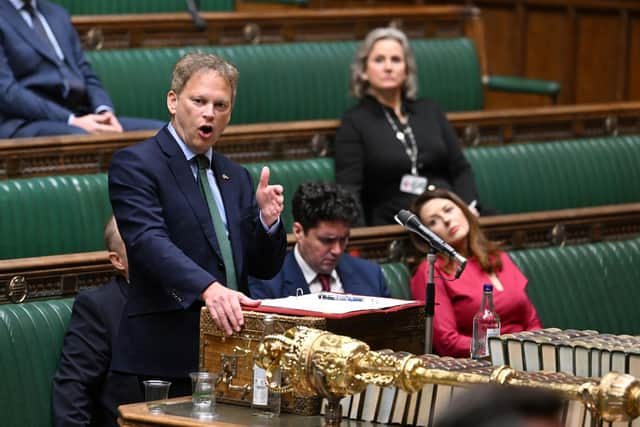Ministers bring forward anti-stike legislation prompting outrage from unions
Yesterday Grant Schapps, the Business Secretary presented a bill to Parliament which would seek to establish minimum safe levels of staffing and activity across areas such as the railways and emergency services.
If unions were not to follow this legislation once it becomes law, then it will lose its legal protection from damages, leaving open the prospect of companies suing smaller trade unions into bankruptcy.
Advertisement
Hide AdAdvertisement
Hide AdThis comes only one day after ministers in a range of departments held talks with union leaders across various professions on strike in a bid to find a compromise over pay and working conditions.


The Government will now consult on what the acceptable minimum service levels are across fire, ambulance, and rail services, which will take into account the effect on the public and the potential risk to public safety.
The Department for Business, Energy and Industrial Strategy (BEIS) yesterday said that although ministers would seek to agree a “sensible and voluntary agreement” with sectors over what a “reasonable level of service” should be during strike action, it warned this new bill will give the Government the power to set in and impose its own limits if necessary.
Grant Shapps, the Business Secretary, said: "The first job of any government is to keep the public safe. Because whilst we absolutely believe in the ability to strike, we are duty-bound to protect the lives and livelihoods of the British people.
Advertisement
Hide AdAdvertisement
Hide Ad"I am introducing a bill that will give Government the power to ensure that vital public services will have to maintain a basic function, by delivering minimum safety levels ensuring that lives and livelihoods are not lost
"We do not want to have to use this legislation unless we have to, but we must ensure the safety of the British public.”
Trade Unions reacted furiously to the announcement yesterday, with the Trades Union Congress calling the legislation “almost certainly illegal” that would risk further strikes.
Matt Wrack, the Fire Brigades Union general secretary called for “a mass movement of resistance to this authoritarian attack”.
Advertisement
Hide AdAdvertisement
Hide AdUnite general secretary Sharon Graham said: “This Bill is another dangerous gimmick from a Government that should be negotiating to resolve the current crisis they have caused.”
The move comes as Yorkshire ambulance workers are set to strike for the second time today.
Almost 500 will stage major pickets in cities and towns across the region after it cancelled planned strikes over Christmas to allow the Government to “talk to us about pay”.
“Ministers have dithered and postured, wasting valuable time,” said Rachel Harrison, GMB National Secretary.
Advertisement
Hide AdAdvertisement
Hide AdYesterday the Health Secretary did not rule out backdating next year’s NHS staff pay settlement, as the Government continued to struggle to end the dispute with healthcare workers over pay.
Steve Barclay was part of meetings with trade union officials on Monday and said that the discussions were “productive” during a visit to a hospital in London.
Speaking to broadcasters, Mr Barclay said that the “key focus of the meeting was to look at next year’s pay review body and the evidence that we submit to that” and said that he would take the message from trade unions back to Chancellor Jeremy Hunt.
The Royal College of Nursing (RCN) and Unite criticised the approach taken by the Government at the meeting, but Unison said there had been an “acknowledgment” from Mr Barclay during the talks that avoiding strikes over next year’s pay settlement would “involve a reach-back” into the current pay year.